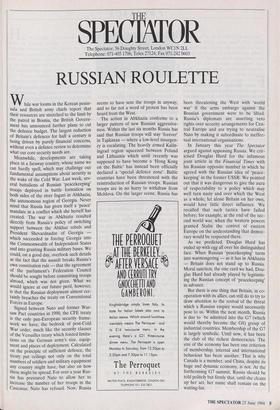SPECT THE AT OR
The Spectator, 56 Doughty Street, London WC1N 2LL Telephone: 071-405 1706; Telex 27124; Fax 071-242 0603
RUSSIAN ROULETTE While war looms in the Korean penin- sula and British army chiefs report that their resources are stretched to the limit by the patrol in Bosnia, the British Govern- ment has announced further plans to cut the defence budget. The largest reduction of Britain's defences for half a century is being driven by purely financial concerns, without even a defence review to determine what our core security needs are. Meanwhile, developments are taking place in a faraway country, whose name we can hardly spell, which may challenge our fundamental assumptions about security in the wake of the Cold War. Last week, sev- eral battalions of Russian 'peacekeeping' troops deployed in battle formation on both sides of the river Inguri in Abkhazia, the autonomous region of Georgia. Never mind that Russia has given itself a 'peace' mandate in a conflict which she herself has created, The war in Abkhazia resulted directly from Russia's policy of switching support between the Abkhaz rebels and President Shevardnadze of Georgia which succeeded in forcing Georgia into the Commonwealth of Independent States and into granting Russia military bases. We could, on a good day, overlook such details as the fact that the assault breaks Russia's own constitution rule — that the agreement of the parliament's Federation Council should be sought before committing troops abroad, which was not given. What we would ignore at our future peril, however, is that the Russian deployment almost cer- tainly breaches the treaty on Conventional Forces in Europe.
Signed between Nato and former War- saw Pact countries in 1990, the CFE treaty is the only pan-European security frame- work we have, the bedrock of post-Cold War order, much like the security clauses of the Versailles treaty which foisted limita- tions on the German army's size, equip- ment and places of deployment. Calculated on the principle of sufficient defence, the treaty put ceilings not only on the total numbers of soldiers and military equipment any country might have, but also on how these might be spread. For over a year Rus- sia has pressured Nato to allow her to increase the number of her troops in the Caucasus. Nato has refused. Now, Russia seems to have sent the troops in anyway, and so far not a word of protest has been heard from the West.
The action in Abkhazia conforms to a larger pattern of new Russian aggressive- ness. Within the last six months Russia has said that Russian troops will stay 'forever' in Tajikistan — where a low-level insurgen- cy is escalating. The heavily armed Kalin- ingrad region squeezed between Poland and Lithuania which until recently was supposed to have become a 'Hong Kong on the Baltic' has instead been officially declared a 'special defence zone'. Baltic countries have been threatened with the reintroduction of Russian troops. Russian troops are in no hurry to withdraw from Moldova. On the larger scene, Russia has been threatening the West with 'world war' if the arms embargo against the Bosnian government were to be lifted. Russia's diplomats are asserting veto rights over security arrangements for Cen- tral Europe and are trying to neutralise Nato by making it subordinate to ineffec- tual international organisations.
In January this year The Spectator argued against appeasing Russia. We crit- icised Douglas Hurd for the infamous joint article in the Financial Times with his Russian opposite numbet in which he agreed with the Russian idea of 'peace- keeping' in the former USSR. We pointed out that it was dangerous to give the aura of respectability to a policy which may well turn nasty and over which the West as a whole, let alone Britain on her own, would have little direct influence. We recalled that such tactics have failed before; for example, at the end of the sec- ond world war, when the western powers granted Stalin the control of eastern Europe on the understanding that democ- racy would be respected there.
As we predicted, Douglas Hurd has ended up with egg all over his distinguished face. When Russian 'peacekeeping' turns into warmongering — as it has in Abkhazia — Britain does not stand up to Russia. Moral sanction, the one card we had, Dou- glas Hurd had already played by legitimis- ing the Russian concept of 'peacekeeping' in advance.
But there is one thing that Britain, in co- operation with its allies, can still do to try to draw attention to the revival of the threat which a Russian empire would necessarily pose to us. Within the next month, Russia is due to be admitted into the G7 (which would thereby become the G8) group of industrial countries. Membership of the G7 is largely symbolic. Until now, it has been the club of the richest democracies. The size of the economy has been one criterion of membership, internal and international behaviour has been another. That is why Canada is a member, and China, despite its huge and dynamic economy, is not. At the forthcoming G7 summit, Russia should be told politely but firmly that, until she cleans up her act, her name shall remain on the waiting-list.
































































 Previous page
Previous page